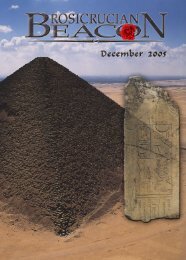Rosicrucian Beacon Magazine - 2010-09 - AMORC
Rosicrucian Beacon Magazine - 2010-09 - AMORC
Rosicrucian Beacon Magazine - 2010-09 - AMORC
You also want an ePaper? Increase the reach of your titles
YUMPU automatically turns print PDFs into web optimized ePapers that Google loves.
ut “hating oneself ” does nothing to reduce the discrepancy<br />
between one’s self-image and the evidence contrary to it.<br />
Nearly everyone uses a mirror at times for selfgrooming,<br />
and one can wonder whether this leads to selfevaluation<br />
in any respect other than the appearance of the<br />
physical self. <strong>Rosicrucian</strong> students use a mirror for various<br />
psychic experiments and home exercises, and in light of the<br />
foregoing reports, one can wonder whether studying in front<br />
of a mirror would tend toward greater self-evaluation and<br />
self-honesty, or would distract from the object of study, or<br />
would make a person so uncomfortable that he or she would<br />
abandon the study period.<br />
The “Total” Self<br />
Apart from the factual material presented by Professor<br />
Wicklund, there are some other considerations. All of the<br />
foregoing deals with self in a piecemeal fashion, with its<br />
aspects or components rather than the whole. This is the<br />
workaday self, the “outer self,” that is involved in all our<br />
daily doings. When attention turns inward to the outer<br />
self, it embraces only one or a few salient aspects, but not<br />
self as a whole.<br />
Some will of course be uncomfortable with this<br />
viewpoint. In fact, a popular slogan used today is “be<br />
The idea of the Self is abstract at the very least and<br />
almost certainly beyond ordinary knowledge.<br />
holistic,” which means that a person should consider him<br />
or herself as a single though multifaceted whole..., whether<br />
in healing, teaching, adjudication or any other relationship.<br />
However, it is doubtful that the totality of a person can, with<br />
the outer self, ever be fully conceived (“embraced”) by his<br />
or her full conscious attention.<br />
Many people are already familiar with a different<br />
concept of self, known as the “inner self,” the “true self,” or<br />
quite simply as Self (with a capital “S”). This Self is considered<br />
to be a “chip off the old block,” partly mortal, partly divine.<br />
The divine part…, the part that is beyond intellectual<br />
analysis, is considered to be indestructible, whole, and<br />
not fractioned into parts as the other, outer, multi-layered<br />
self is. The Self might be construed as the core of self as<br />
opposed to the components of self. According to mystical<br />
lore, we gain “knowledge” of this inner Self by developing<br />
“psychic awareness,” which means in effect, bypassing the<br />
component parts of the outer self that are manifested in<br />
day-to-day affairs. A psychologist however, might suspect<br />
that this is merely a form of evasion, avoiding self-evaluation<br />
by withholding any effort to reduce discrepancies between<br />
an idealised self-image and actual behaviour.<br />
Many people are already<br />
familiar with a different<br />
concept of self, known as<br />
the “inner self,” the “true self,”<br />
or quite simply as“Self.”<br />
The idea of the Self, namely, the core of or the<br />
aggregation of all aspects of the multifaceted outer self taken<br />
as a single unit of consciousness..., is abstract at the very least<br />
and almost certainly beyond ordinary knowledge..., even<br />
though it may not be beyond experience. It is therefore<br />
a very tricky area of investigation for hard science. If one<br />
begins with the abstract concept of the Self, one may assume,<br />
and try to realise a concrete entity that fits the picture of a<br />
psychological process. This is called reification. Also there<br />
is a question as to one’s point of reference or viewing point.<br />
Who and where is the observer who is to become aware of<br />
that whole, immortal Self ? It can be none other than the<br />
familiar, practical, mortal outer self, the one that is aware of<br />
the world and of itself in the world, but cannot perceive its<br />
complete totality.<br />
That is not unfortunate. A sane person cannot<br />
escape the outer self and has no choice but to go<br />
right along with it. In the end, if the personality<br />
(or soul personality) is to develop during this life<br />
span, it will be in terms of its daily experiences and responses,<br />
with piece-meal accretions to and transmutations of its own<br />
awareness: To “know thyself ” is a matter of self-attention<br />
to its many component parts, and truly knowing thyself is<br />
beyond the scope of all enquiry.<br />
Where the grand concept of the total, divine Self has<br />
great value is in connection with cosmic principles and<br />
cosmic factors whereby such transmutations can be brought<br />
about more readily in our daily lives. The ideal of the divine<br />
Self is the pattern toward which these transmutations can<br />
advance-as in the mystical saying, “as above, so (be it) below.”<br />
FOOTNOTES<br />
1. Robert A. Wicklund, “The Influence of Self-Awareness on Human<br />
Behaviour” American Scientist, 67:187-193, 1979.<br />
2. C.S. Carver, “Physical Aggression as a Function of Objective Self-<br />
Awareness and Attitudes Toward Punishment.” Journal Exper. Social<br />
Psychology 11:510-19, 1975.<br />
3. E. Diener, and M. Wallbom, “Effects of Self-Awareness on<br />
Antinormative Behaviour.” Journal Research in Personality, 10:107-<br />
11, 1976.<br />
44<br />
The <strong>Rosicrucian</strong> <strong>Beacon</strong> -- September <strong>2010</strong>











